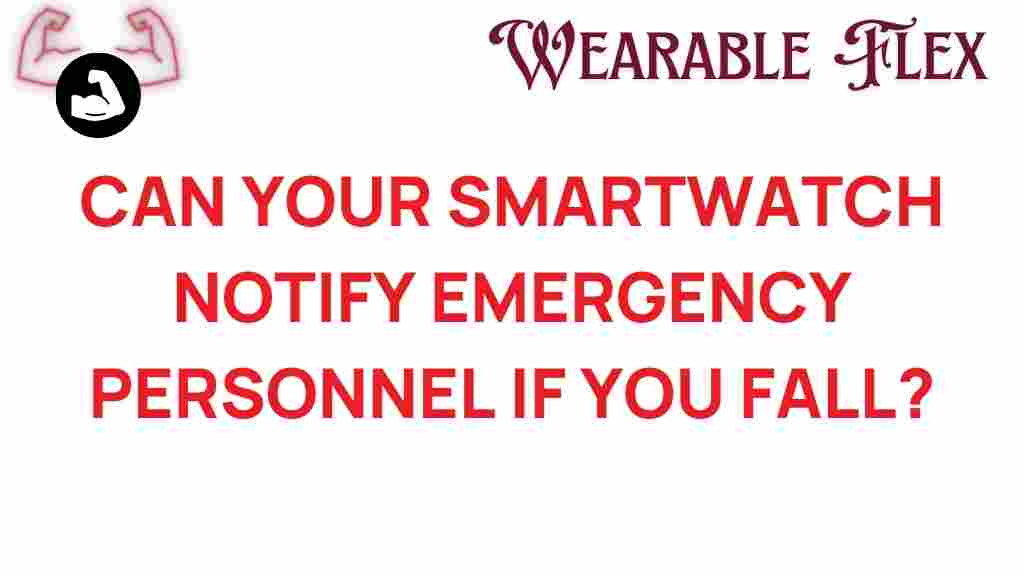Can Your Smartwatch Be Your Lifeline in an Emergency?
In today’s fast-paced world, technology is woven into the fabric of our daily lives. One of the most significant advancements is the rise of the smartwatch. These devices do more than just tell time; they are equipped with various features that can be invaluable in emergencies. But can your smartwatch truly serve as your lifeline when every second counts? In this article, we will explore how smartwatches can be essential tools in emergency situations, the features that enhance their utility, and how to effectively use them.
Understanding the Features of a Smartwatch
Before diving into the specifics of how a smartwatch can assist in emergencies, let’s understand what features make these devices so powerful. Most modern smartwatches come equipped with:
- Heart Rate Monitor: Tracks your heart rate and can alert you to irregularities.
- GPS Tracking: Provides real-time location data for navigation and emergency services.
- Fall Detection: Automatically detects falls and can send alerts to emergency contacts.
- Emergency SOS: Sends a distress signal to pre-set contacts and can share your location.
- Health Monitoring: Tracks vital signs and can alert you to potential health issues.
- Communication Tools: Allows you to make calls or send messages directly from your wrist.
How Can a Smartwatch Be Useful in an Emergency?
Now that we know the features, let’s explore specific scenarios where a smartwatch can act as a lifeline:
1. Medical Emergencies
In a medical crisis, every second counts. Here’s how a smartwatch can help:
- Heart Rate Alerts: If your heart rate exceeds a certain threshold, the smartwatch can alert you and your emergency contacts.
- ECG Monitoring: Some smartwatches offer ECG features that can detect atrial fibrillation, an indicator of serious heart conditions.
2. Personal Safety
Your smartwatch can also be a critical tool for personal safety:
- Fall Detection: If you’re alone and fall, your smartwatch can automatically call emergency services.
- Emergency SOS: By holding down a specific button, you can alert authorities and share your location with your emergency contacts.
3. Outdoor Adventures
If you love hiking or running, a smartwatch can be a lifesaver:
- GPS Tracking: If you get lost, your smartwatch can help you find your way back or send your location to someone who can help.
- Weather Alerts: Many smartwatches provide real-time weather updates, which can be crucial when you’re outdoors.
Step-by-Step Process: Setting Up Your Smartwatch for Emergencies
To ensure your smartwatch is ready for emergencies, follow these simple steps:
Step 1: Update Your Emergency Contacts
Make sure your smartwatch has up-to-date emergency contacts. This feature is crucial for the Emergency SOS function.
Step 2: Enable Fall Detection
If your smartwatch has a fall detection feature, enable it. This can automatically alert emergency services if you fall and cannot respond.
Step 3: Set Up Heart Rate Alerts
Configure your heart rate monitor to send alerts if your heart rate goes above or below a certain level.
Step 4: Download Relevant Apps
Consider downloading additional apps that enhance safety, such as:
- Emergency medical information apps
- Navigation and mapping apps
- Weather alert apps
Step 5: Familiarize Yourself with Features
Spend some time getting to know how to use the emergency features of your smartwatch. Practice activating the Emergency SOS and fall detection functions.
Troubleshooting Common Smartwatch Issues
While your smartwatch is a powerful tool, issues can arise. Below are common problems and their solutions:
Problem 1: Smartwatch Won’t Connect to Phone
If your smartwatch isn’t connecting to your phone:
- Ensure Bluetooth is enabled on your phone.
- Restart both the smartwatch and the phone.
- Unpair and then re-pair the devices.
Problem 2: Emergency SOS Isn’t Working
If your Emergency SOS feature isn’t functioning:
- Check if you have set up the emergency contacts correctly.
- Make sure your smartwatch is updated to the latest software version.
Problem 3: Battery Draining Too Quickly
A fast-draining battery can be a significant issue:
- Reduce screen brightness and turn off unnecessary notifications.
- Disable features you’re not using, such as GPS or Wi-Fi.
Conclusion
In conclusion, your smartwatch can indeed be a lifeline in emergencies. With the right setup and knowledge, these devices can help you monitor your health, alert emergency contacts, and navigate challenging situations. As technology continues to evolve, the potential of smartwatches in enhancing personal safety and health monitoring will only grow. Don’t wait for an emergency to discover the functionalities of your smartwatch; take the time to familiarize yourself with its features today!
For more information on how to maximize the use of your smartwatch, consider checking out this comprehensive guide. Whether you’re looking for safety features or health monitoring, your smartwatch could be a vital asset in your daily life.
Stay safe and connected!
This article is in the category Health and created by WearableFlex Team
